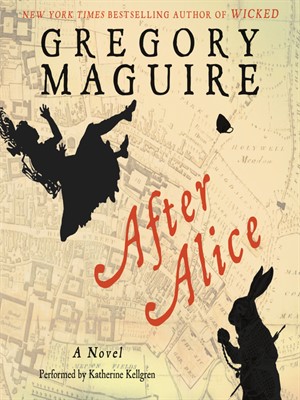“All of life hinges on what one does next, until finally one makes the wrong choice. But was this that moment?”
“Alice, I’m coming.”

After Alice, by Gregory Maguire, tells the story of what was happening in Alice’s world after she chased the white rabbit and fell down the rabbit hole. It can be a difficult book to read and follow, especially the first few chapters, but the more I read the easier (and better) it got. The more I read, the more I liked it, and by the end I really liked it. It isn’t going on my “Favorite Books” list, but I liked it well enough to maybe read it again one day. It isn’t a long novel, but it also isn’t a quick read.
In between the telling of the actual story the author inserts thoughts and lectures on a variety of topics– philosophy, theology, evolution, architecture, even the city of Oxford itself. It’s all very smart and interesting, but it’s also what makes the book difficult to understand at times. The topics the author touches on, and themes he hints at, add to the novel in a way I can barely comprehend- I can’t deny that. But you really could take those parts out of the book and the story itself would remain in tact.
After Alice switches back and forth between the underworld and the “upper world.” The narration also switches from character to character. Usually I don’t like this in a book, sometimes I absolutely despise it, but in this case it wasn’t so bad and it didn’t bother me that much.
Alice is mentioned throughout the story, and we learn a lot about her peculiar personality, but she isn’t an active character in this novel. She doesn’t appear until the very end and has only a few lines of dialogue, but they’re great. Quintessentially Alice.
The main characters are Alice’s older sister Lydia, her friend Ada, and Ada’s governess, Miss Armstrong. The reader learns a lot about Alice’s older sister Lydia, which I found really interesting. You also learn a great deal about Ada, “a friend of Alice’s mentioned briefly in Alice’s Adventures in Wonderland.” (Many of the well known characters from the original Wonderland novel are also in After Alice– the Mad Hatter and the hare, the White Rabbit, the White Queen, and the Queen of Hearts, as well as others.)
Ada is a curious character and I liked her. There is a lot of description about her physical appearance. She is described as having a “distortion in her skeletal structure,” and walks with “a stoop and a gimp.” In an attempt to correct this Ada has to wear an iron corset, and all of this comes into play throughout the story.
We also learn a little about the members of Ada’s family, her quiet father the Vicar, her “dropsical” mother, and her new-born baby brother who has a large impact at the start of the story. I found it both fascinating and annoying that the author referred to the baby in 15 different ways within the span of only 5 pages!
Good god, I had no idea what the hell was going on at first! It took me forever to understand that the author was only talking about a colicky or sick baby. The problem was he didn’t just come out and say it. Apparently Mr. Maguire has something against clarity! Or maybe laziness. Gregory Maguire wants you to work for the story, he isn’t going to just hand it over to you, you mental loafer!
So, as I was saying, Ada’s baby brother is referred to in 15 different ways in the space of only 5 pages. First it’s the poor creature and then pink smudge of infant, infant in peril, wretched offspring,
“His Lordship the Infant Tyrant”
“The Tiny Interruption”
“Boy Boyce,” etc.
There are also several minor, but very interesting characters. Mrs. Brummige and Rhoda, two servants in Alice’s household. Mr. Winters, an American man visiting England with his adopted son. Siam, Mr. Winters’ adopted son, a young boy rescued from slavery in the South. And, the biggest surprise character of all, Darwin. Yes, the Darwin is a character in After Alice.
So, as I said, even though I got off to a rough start with After Alice, in the end I really liked it. Actually, it was the surprise, very clever plot twist at the end of the book that sealed the deal. There is a very unexpected “witness” in the trial at the Queen’s garden party- it’s brilliant! I loved it. I also think I got more out of After Alice because I had previously read Alice’s Adventures In Wonderland, so I definitely recommend that.
Also recommended, Confessions of An Ugly Step-Sister.
“An arresting hybrid of mystery, fairy tale, and historical novel. . . . Confessions . . . isn’t easy to classify or forget.” -The Detroit Free Press. (From the back of the After Alice book jacket.)

A hybrid of mystery, fairy tale, and historical novel that isn’t easy to classify?!
How could I not read it! How can I not accept this challenge? Because a challenge it will most definitely be. A friend of mine told me a few weeks ago that she read Confessions, and she confessed to encountering the same difficulties that my mother-in-law and I had with Wicked and After Alice- a hazy, patchy style of storytelling, too many obscure words, a lot of philosophical sidebars that do not seem to further the plot or character development. She said she didn’t know what was going on until several chapters into the book, and even then the story still wasn’t very clear most of the time.
Still, I don’t think I’ll be able to resist reading it.
However, that won’t be until September or October at the earliest. The next book I’m reading is, of course, Harry Potter and the Cursed Child.
